- Home
- Mack Reynolds
Computer War Page 12
Computer War Read online
Page 12
Ross turned on Tilly, then shot his eyes to Combs and around at the others. Most of them were grinning and eying him expectantly, though he couldn’t think why that should be in their expressions.
It came to his lips before it was fully comprehended in his mind. “So are the rest of you!”
The Temple Monk put down his empty cup. He sighed and said, “Let us be seated. I am sure we’ve all been through a great deal in the past hours. However, there is no opportunity for much rest, and we’re even short of time for explanation.”
He took his own advice and utilized one of the benches that ran along the mess table. Six or eight of the others, including Ross, Tilly and Combs, seated themselves as well, but the others remained standing.
Pater Riggin brought his eyes back to Ross and said, “My son, you do not suppress an ideal by butchering its adherents, unless you are in position to liquidate them all. Even then it may germinate among others. This most certainly applies to social systems. Decimate the adherents enough and they will go underground, perhaps, but the teachings remain—be they right or wrong—and will hibernate until opportunity presents itself again to make a bid for realization.”
“Then in spite of Number One’s efforts for the past half century, the Karlist movement remained in existence, underground?” Ross asked.
“Correct.”
Ross looked at Tilly, scowling. “But what’s this got to do with the extent to which you Betastani have infiltrated Alphaland?”
“Don’t be dense, Rossie. Had we been limited to signing up Alphaland traitors and buying the money-hungry, we would have had a small underground indeed. But when we were able to gain the cooperation of a whole socioeconomic movement, comparatively small though its membership might be, we had on our side an organization of dedicated idealists. And that you can’t beat when you’re in the clutch, Rossie mine.”
Then you’re all, all damned Karlists!” he snapped.
Pater Riggin put back his rounded head and laughed.
“My son, my son. Please remember that I lived through the civil war, heard the slogans, even helped write the diatribes against the movement. Sat at the side when the leaders, some of whom were long-time friends, were tried and shot. Participated through it all as an active anti-Karlist.”
“But you just said…”
The older man held up a hand. “To my shame and sorrow, it was not until later that I was able to rise above the slogan level and actually investigate the teachings of these people. It was then that I became converted—much too late to have got myself shot as an adherent.”
Ross was scowling at the Temple Monk. From the side of his eyes, he could see Tilly Trice watching him intently with an element of worry there. This was apparently of the greatest importance to Tilly. He refused to consider the obvious reason why.
Pater Riggin was more serious now.
“Ross Westley, most great beliefs, ideals, can be summed up in a sentence or two. If they need more, then there is a weakness, the belief is not whole. So then, in your own words, tell me what you think the basic teaching of the Karlists is?”
Ross looked at him. All his life, since he had been a child at the knee of the passionate Franklin Westley, he had been subjected to the anti-Karlist teachings. In these, his later years, he had even participated in spreading them. Long, supposedly, after the Karlists had been a danger.
Anti-Karlism was a dogma, a faith, he knew. Decades past, the adherents of Number One had dug out every last book or pamphlet written by that organization’s leaders and had burned them. Every novel, ever so lightly tinged, every play, or even verse, that could be accused of Karlist leanings—all were destroyed. It came to him now that he, Deputy of Information, had never actually read a true Karlist book or article. Oh yes, books on socioeconomics which had quoted in limited amounts from this work or that, the better to criticize and condemn the movement, but the basic works of the enemy? He didn’t know, but he doubted if even Number One had them in his private library. Or even Mark Fielder.
His voice, as though in spite of himself, was wild again. “They’re anarchists. They want to tear down everything that their betters have built. They want to turn society on its head and let the yokes rule their superiors.”
Altschuler said softly, for once without humor, That, fella, is exactly what we don’t want to do. You’ve been reading your own propaganda again.”
Pater Riggin volunteered. “Let me do it for you. In a sentence, Ross Westley, the basic belief of the Karlists is that government should be instituted to help realize the full potentialities of each member of society.”
Ross was put to staring again.
He shook his head in disgust. “Any government subscribes to that!”
But Pater Riggin shook his head right back. “Then most of them lie. Because most governments are instituted to maintain the privileges of a minority, against the interest of society as a whole. The interest of society as a whole is to realize the full potentialities of each individual member of society.” Ross continued to stare, his indignation waning. The older man pressed on. “They will all say that is their goal, but they lie. A socioeconomic system based on an aristocracy, such as feudalism, keeps at the helm a nobility that is not necessarily competent. Many an emperor or king, down through the ages, was actually insane. I mention in passing such as Caligula and George Third of England.”
Ross said, “What’s that got to do with the policy of the government being directed at realizing the full potentialities of the people?”
“My son,” the Temple Monk said with a twinkle, “if the ultimate head of the government is in a job that has nothing to do with real capabilities and potentialities, what can we expect on lower levels?
“But to go on. Various other socioeconomic systems have been seen in which the possessors of power and wealth dominated government to the benefit of themselves and their immediate relatives and friends. As good an example as any was England during the Nineteenth and Twentieth Centuries of Mother Earth. The British writer, Somerset Maugham, once wrote that he had met many of the top leaders of government and was at first surprised at how indifferently intelligent they were. He came to the conclusion that it didn’t take particularly intelligent people to run a government. Of course, finally, under the administrations of these incompetents, Great Britain became a third-rate power.
“To go on still further, we find the so-called communists of the Twentieth Century. Rip-snorting idealists when first they came to the helm, we were soon able to observe that party membership and relationship to ranking members of the hierarchy counted most when it came to obtaining high office. Ability was not necessarily the thing. The son of Stalin, although known as a problem drinker, quickly became a general of the air force; the son-in-law of Khrushchev was soon top editor of Pravda.”
The Temple Monk was smiling at him. I submit, Ross Westley, that none of these socioeconomic systems was in truth utilizing the full potentialities of the citizenry. If at the top you do not have the most suited elements guiding the country, certainly all the way down the line nepotism, the power of money, and a score of other factors will hinder many from realizing their most.
“Do you know the real motivation of Number One and his Old Hands when they fought the Karlists in the streets? Whatever the highblown slogans they repeated ad nauseam, in actuality they were fighting to preserve a system of privilege. Your father was fighting to preserve a system under which he could hand down his high office to you, his beloved son, in spite of the fact that you were unsuited to hold it. He must have known it, toward the end of his life, but that didn’t prevent him from urging Number One to appoint you to the position. I suspect you do not even like the job as Propaganda Deputy, but so it is. You, though one of the highest ranking officials in Alphaland, would be more suited to be a professor of history, and undoubtedly happier. I suspect Emperor Caligula would have been better off had he lived under a system where he would have found his own level, based on his true abilitie
s, rather than having been born into the Julian family and being shunted into the Imperium.”
The historian in Ross Westley prevented him from being at sea in this. He said slowly, “Perhaps the stated purpose of your organization is very fine, however, I wonder to what extent government is needed for a man to realize his true worth, under any society. Top men will come to the top under any socioeconomic system.”
Altshuler leaned forward. “Are you sure? Or are you confusing the fact that the men in control will proclaim that they are top men? Gangsters such as Stalin, Hitler, Mussolini, Chiang Kaishek and Franco, to name a handful at one period in history, will shoot their way to power, and then, the propaganda machine in their hands, the schools, entertainment and news media in their hands, will proclaim themselves the top elements of the country, the best and most intelligent. Who in Nazi Germany wasn’t led to believe that those who led were the best, most idealistic and dedicated men in the land?”
Pater Riggin took over again.
“Admittedly, some men, of certain types, will struggle to the top given any society. However, many of our most capable are not of this nature. For instance, the early American electrical wizard, Steinmetz, was a cripple. Had he been born a slave in Roman society, he would have been knocked over the head at birth, his potentialities never realized. Some of our artists, poets and such, are not of the caliber to fight. It is no coincidence that the three great poets of the British romantic period, Byron, Shelley and Keats, were all protected from want throughout their lives. Byron was a lord, Shelley a baron, Keats from a well-to-do family. But suppose any of them had been born into a life of child labor in the mills of Manchester? Would any of them have become poets? Their contemporaries, such as Leigh Hunt and Thomas Hood, born into poverty, were possibly their equals in talent, but had to spend their lives doing newspaper work, writing reviews, or humorous verse meant for the semi-literate.”
Ross said, suddenly impatient, “All right, this could go on forever. The point is, you admit that you’re subversives.”
Combs said curtly, “Proud of it.”
Pater Riggin said, “It’s all according to what you’re subverting, Ross Westley, whether or not the term is a derogatory one. Jesus was a subversive, and so were Washington and his coaids.”
Feeling irritation at being on the defensive, Ross struck out. “You tell a fine story, Pater but to reinforce Centurion Combs’ opinion when you first entered, let me point out that you yourself wear a garb that doesn’t exactly proclaim you a liberal. You mentioned Washington, did you ever run into this quotation from a Coaid of his, Thomas Jefferson? In every country and in every age, the priest has been hostile to liberty. He is always in alliance with the despot, abetting his abuses in return for protection of his own.’”
Even as he quoted, the words of Temple Bishop Stockwater about the lesson of Mexico came back to him and he finished by saying slowly, “I am afraid your United Temple sees the handwriting on the wall this time and is attempting to repair its public image.”
“Too late,” Altshuler grinned. “The ball’s already begun to bounce.”
Ross looked at the subversive Temple Monk again. “You haven’t explained remaining in the United Temple.”
Pater Riggin shrugged his fat padded shoulders. “For one thing, it was the perfect protective covering. But there’s another thing, Ross.” His face lost its humor. “A people get the religion they want and deserve, just as they get the government they want and deserve, on an average and given time. A false religion remains a popular one only so long as the people support it; an antiquated socioeconomic system remains only so long as the people support it.”
His chuckle now was sour. “When the majority of the people on this planet no longer accept belief in the Holy Ultimate and the United Temple, which represents this conception, then it will wither away. Not before. Attacking the organization physically might drive it underground, but never destroy it. It will be destroyed only by education and man’s evolution to a higher level of understanding.”
Tilly, who had remained uncharacteristically silent, spoke up. “Rossie,” she said, the old mockery in the back of her words, “you’re desperately fighting your friends and I suspect that inwardly you know it.”
“What’s that supposed to mean, Till?” he snapped angrily.
“I think you know. Individuals, no matter of how much goodwill, are apathetic when it comes to changes in the institutions with which they are familiar. They will put up with almost anything before facing the need of changing basic cultural habits, political forms, religions or socioeconomic systems. For instance, I suspect that in actuality you believe the United Temple to be parasitical. But all your life you have paid it lip service, and I suspect too, in argument about the desirability of maintaining the institution, you would drag up some moth-eaten opinion supporting the need for keeping the ignorant happy, or teaching the basic virtues, or some such. You’ve been dragging your heels about speaking up and announcing what you truly believe.”
He looked at her unhappily.
Altshuler laughed. “Tilly, you sound like a soapbox lecturer, rather than the head of a couple dozen ragged ‘guerrillas’.”
She snorted back at him. “One’s as important as the other, each in its place.”
She came to Ross again. “The same apathy applies in the field of political economy. Look back over your history, Rossie, and consider how long some people put up with ridiculous social systems after everyone in the nation, for all practical purposes, knew them to be ridiculous.
“But that apathy, given a spark, can be changed overnight to the desire for changes. Had you suggested, one year before the Declaration of Independence, that complete freedom from England was the only solution to the problems of the colonists, you probably would have been stoned in the streets. Lenin wrote, less than six months before coming to power, that he never expected to live long enough to see the proletarian revolution. And so it goes.
“Rossie, the Karlists have been waiting a long time for this opportune moment. The Alphaland invasion of Betastan was the spark that set things underway. Not only in Alphaland, where your people are already on the streets in revolt against the war and the government of Number One and his Coaids, but in Betastan as well”
Gonzales, the electronics expert, spoke up for the first time. “And in four or five of the neutrals, according to radio. Karlists in some of those countries were kept from acting, only because they were afraid of the Alphaland air marines intervening if they tried anything, but with this country tied up, the revolt was on.”
Tilly’s voice went persuasive. “What does it take to bring you around, lover-mine? In your secret heart you’ve known for a long time where you really stood. Otherwise you wouldn’t have been leaking information to me that could be used against Number One.”
Ross looked from her to Pater Riggin, to Combs, to Altshuler, to Bernal and the rest. And then, desperately, completely around the circle again.
He stood suddenly. “What do you expect from me?” he demanded.
“Sit down, son,” Pater Riggin said mildly. “Well bring you up to date.”
He pursed his plump lips. “In actuality, there has been as much unscheduled change in Betastan as there has been here. At present, real government is in the hands of the guerrillas, the leaders of whom are Karlists. They wish as quick an end of hostilities as possible so that they can present their program to the people for an immediate vote.”
“And what is their program?”
“Immediate amalgamation with Alphaland, with the eventual aim of world government.”
“WHAT!”
The false Temple Monk looked at him without answer.
Ross blurted, “But that’s Number One’s program!”
Tilly tinkled laughter. The young guerrillas around her chuckled softly.
Pater Riggin said slowly, “Only to a certain point, Ross. To a certain point it is the program of any thinking person. This planet is well suited
for a unified government and has been for some time; Betastan and Alphaland being so delicately balanced has stood in the way of such a unification. Number One, of course, has wished world rule—under Number One and his Coaids. That is rejected, obviously, by the Karlists. The new government will be decided upon by representatives from all the participating countries—a Constitutional Convention, you might call it, with the basic theory of the Karlists behind it”
Ross slumped back in his seat.
For the moment they didn’t disturb him, though watching carefully, waiting for a response that they all seemed to expect. All, perhaps, except Centurion Combs who had a cynical expression on his youthful face.
Ross Westley finally took a deep breath and said, “All right. What has all this got to do with me? What is it you want from me?”
A sigh went through them.
Two or three of the exhausted irregulars, as though this were all that had been keeping them from needed rest, went back to their bunks.
Pater Riggin quickly outlined the developments of the past twenty-four hours, during which time Ross had been recovering from his concussion.
“Fielder and his triumvirate are making their bid for power. They won’t win, eventually, but unless thwarted now, they’ll cause endless additional bloodshed.”
“What can we possibly do to prevent them?”
The former Temple Monk said, “A great deal. The strongest positions they hold are Surety, the military and Finance, none of which are particularly popular now for obvious reasons.”
“Well,” Ross said sarcastically. “We hold nothing.”
Pater Riggin arched his eyebrows. “To the contrary, we have Number One, himself, you, the Deputy of Information, and Philip McGivern, head of the Department of Socioeconomics though he is now hospitalized.”
Ross looked at the older man as though he were mad. “You expect Number One to support a Karlist takeover?”
The other smiled and shook his heavy head. “Not exactly. I expect him to combat a take-over by Fielder, Croft-Gordon and Matheison. In his present fury—I might mention, he is not a particularly intelligent man—he is not taking the long view. He would rather pull his whole world down around his shoulders, than see his immediate enemies prevail over him. It is a characteristic of dictators, so I understand.”

 Happy Ending
Happy Ending Space Visitor
Space Visitor A Kiss Before Loving
A Kiss Before Loving Episode on the Riviera
Episode on the Riviera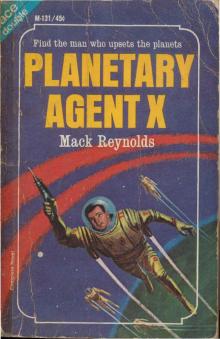 Planetary Agent X
Planetary Agent X Rolltown bh-3
Rolltown bh-3 The Second Mack Reynolds Megapack
The Second Mack Reynolds Megapack Dawnman Planet up-2
Dawnman Planet up-2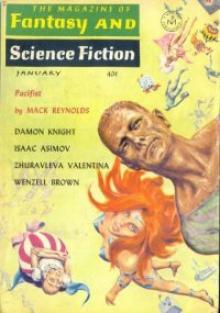 Pacifist
Pacifist The Other Time
The Other Time Once Departed
Once Departed IQ
IQ Computer War
Computer War Earth Unaware
Earth Unaware The Rival Rigelians up-3
The Rival Rigelians up-3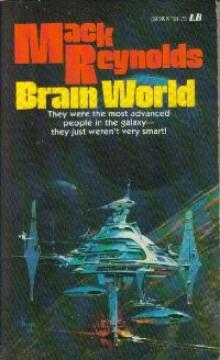 Brain World up-7
Brain World up-7 Star Trek - TOS - Mission to Horatius
Star Trek - TOS - Mission to Horatius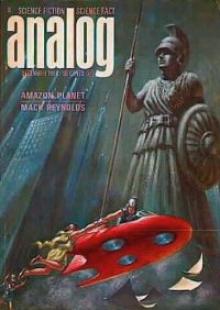 Amazon Planet up-5
Amazon Planet up-5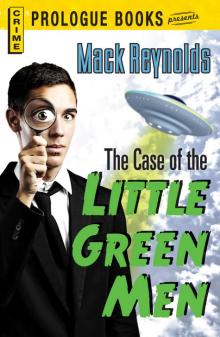 The Case of the Little Green Men
The Case of the Little Green Men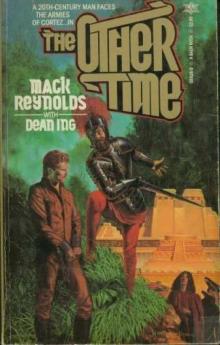 Other Time
Other Time The Mack Reynolds Megapack
The Mack Reynolds Megapack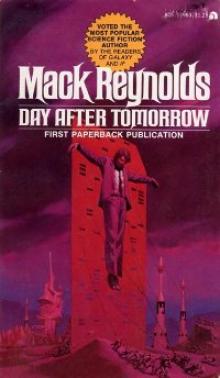 Day After Tomorrow
Day After Tomorrow The Devils & Demons MEGAPACK ®: 25 Modern and Classic Tales
The Devils & Demons MEGAPACK ®: 25 Modern and Classic Tales Mission to Horatius
Mission to Horatius Ability Quotient
Ability Quotient Galactic Medal of Honor
Galactic Medal of Honor Trojan Orbit
Trojan Orbit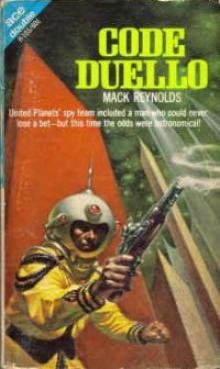 Code Duello up-4
Code Duello up-4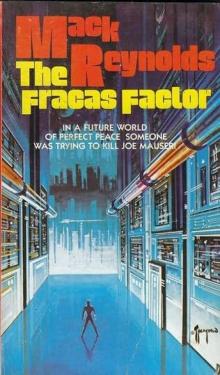 The Fracas Factor
The Fracas Factor The Second Pulp Crime
The Second Pulp Crime Deathwish World
Deathwish World Planetary Agent X up-1
Planetary Agent X up-1 Blackman' Burden na-1
Blackman' Burden na-1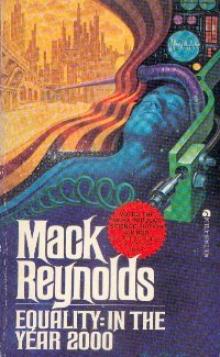 Equality: In the Year 2000 jw-2
Equality: In the Year 2000 jw-2 The Best Ye Breed na-3
The Best Ye Breed na-3 The Jet Set
The Jet Set The Rival Rigelians
The Rival Rigelians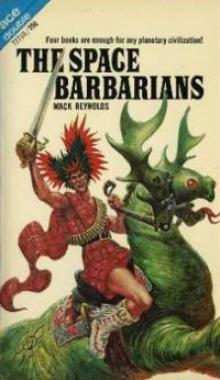 The Space Barbarians
The Space Barbarians